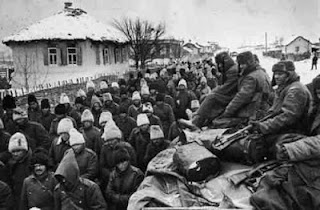I was in a local school looking at a wall chart produced by pupils on the key events of the Second World War. Emphasis was rightly given to the Battle of Britain and D-Day, but no mention was made of the war in Eastern Europe. It’s the 70th anniversary of the titanic struggle at Stalingrad perhaps the most decisive battle of the war- an anniversary that has hardly been mentioned in the British media. This struggle in which the Nazis and their allies fought the Soviet Union for control of the city named for the Russian dictator was one of the bloodiest in the history of warfare with estimated 2 million casualties. The 6-month campaign, which climaxed in January 1943, inflicted catastrophic losses on the Third Reich from which it never recovered.
From June 1941 the Soviet Union was an ally of Britain. In Leek, as elsewhere in the UK, awareness of the struggle showed itself in the setting up of an Anglo Soviet Friendship Committee meeting at the Town Hall in December 1941. It was part of a co-ordinated response. The Committee busied itself by running fund raising events including a Soviet Medical Aid Fund in the New Year of 1942. Over the duration of the war meetings with speakers and events were held to recognise the super human efforts of our Soviet allies. Over two nights for instance, at Cheddleton Hospital in November 1942 a Russian ballet corps gave a concert.
Perhaps given the continuing interest in the war it is right to emphasis the fact that the Second World War was principally fought in Eastern Europe. It has been estimated that 80% of all German allied personnel died or went missing in action on the Eastern Front
The vast majority of German divisions were concentrated against the Soviet Union - in 1942, for instance, there were 240 fighting in the East and 15 in North Africa and even in 1944 there were more than 200 in the East compared to 50 divisions in the West. The two pivotal battles, Stalingrad and El Alamein, differed in scale by a factor of about ten, or an order of magnitude.
Over 36 million people 19 million of them civilians, died in Europe in this conflict. The real tragedy was that in Eastern Europe one tyranny was replaced with another

No comments:
Post a Comment